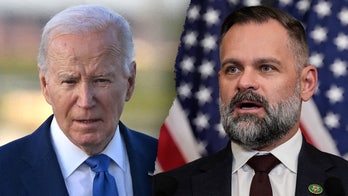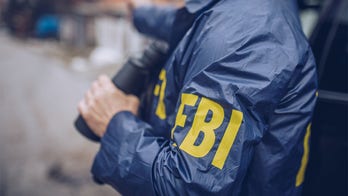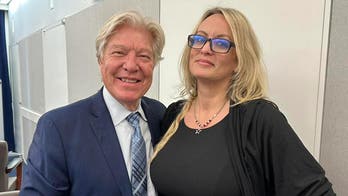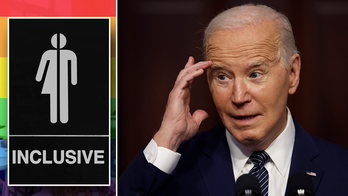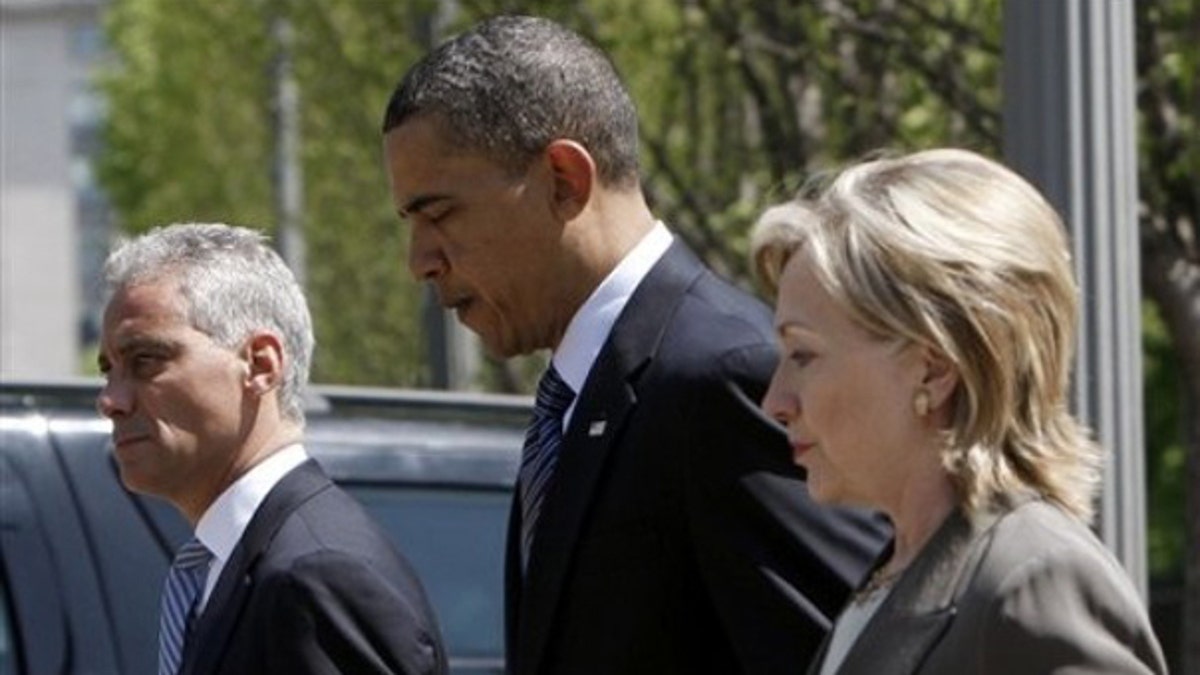
President Obama walks out of the White House with Secretary of State Hillary Clinton and White House Chief of Staff Rahm Emanuel in advance of the Nuclear Security Summit April 11. (AP Photo)
President Obama sees the possibility of nuclear material falling into the hands of terrorists as the "number one security threat" in the world, White House Press Secretary Robert Gibbs said Monday, at the start of the nuclear security summit in Washington.
The president, who is trying to enlist the help of dozens of countries in reducing that threat, capped off a day of one-on-one meetings with Chinese President Hu Jintao Monday afternoon. That followed a meeting with Ukrainian President Viktor Yanukovich, after which the White House announced Ukraine had committed to purging its highly enriched uranium stockpile by 2012.
But officials stressed that the immediate purpose of the summit is not so much to disarm states as to keep nuclear material as far away as possible from terrorist groups.
"The threat of nuclear terrorism is real. It is serious. It is growing, and it constitutes one of the greatest threats to our national security and, indeed, to global security," Obama's top counterterrorism adviser John Brennan said. "The ability to obtain a nuclear weapon and to use it is the ultimate and most prized goal of terrorist groups."
The danger posed by loose nuclear material is the theme of the dinner formally kicking off the summit Monday night.
While the historic two-day gathering of leaders from 47 countries is not expected to result in any major strategy shifts, officials said it serves to get world leaders on the same page about tackling this threat.
Defense Secretary Robert Gates said securing loose material and halting the spread of nuclear weapons is "an area that people talk about a lot but frankly there hasn't been the kind of concerted international attention."
The design of the summit, one of the largest international gatherings ever held on U.S. soil, still leaves Obama's hands tied in some big areas.
Iran and North Korea -- the two countries whose rogue nuclear programs have been front-and-center in the global debate -- were not invited, though their nuclear programs are expected to be part of the discussion.
And India and Pakistan -- countries whose competition for nuclear material could develop into a Cold War-style weapons buildup -- are not expected to get heavy scrutiny. Pakistan is of particular concern, given its volatile location and the thriving presence of both Al Qaeda and the Taliban within its borders.
Lawrence Korb, assistant secretary of defense during the Reagan administration, said world leaders are going to need to deal with the dynamic between those two countries. He said Pakistan will continue to build up its nuclear stockpile as long as it harbors concerns about India's development.
"Even if you succeed here in this conference, if you don't deal with the situation between India and Pakistan, it can cause you a lot of problems," Korb told Fox News. He said an agreement signed under the second Bush administration that allows the U.S. to share nuclear technology with India only agitated the problem.
"This is something that has to be on the agenda," he said, "because Pakistan will never stop as long as they think India is trying to get ahead of them. ... because while we worry about terrorism, they worry about India."
Ilan Berman, vice president of the American Foreign Policy Council, said pushing issues like Pakistan's and Iran's nuclear programs to the side could "undermine" the meeting.
"If Iran does (acquire nuclear-weapons capability) ... it really throws a monkey wrench into the entire purpose of this summit, which is to make sure that nuclear material is less available rather than more available to terrorists," he said.
But the Obama administration, in the lead-up to the summit, has placed more emphasis on the danger posed by rogue terror groups than the danger posed by rogue states.
Obama warned Sunday about the severe and devastating consequences of failing to secure nuclear material. He also held pre-summit, one-on-one meetings with the leaders of India and Pakistan.
"If there was ever a detonation in New York City, or London, or Johannesburg, the ramifications economically, politically and from a security perspective would be devastating," the president said. "We know that organizations like Al Qaeda are in the process of trying to secure nuclear weapons or other weapons of mass destruction, and would have no compunction at using them."
The nuclear summit is the largest gathering of world leaders hosted by a U.S. president since the 1945 conference founding the United Nations.
On the Sunday shows, top administration officials underscored the president's concerns.
"We don't believe the threat from nuclear terrorism comes from states," Secretary of State Hillary Clinton said on ABC's "This Week." "Our biggest concern is that terrorists will get nuclear material."
Clinton said North Korea and Iran also cause concern. She said in the interview aired Sunday that "we fear" North Korea's possession of nuclear weapons and Iran's pursuit of them because "they are unpredictable."
The Washington conference is the fourth leg of Obama's campaign toward a nuclear weapon-free world. The goal, which the president admits probably will not be achieved in his lifetime, began a year ago in Prague when he laid out plans for significant nuclear reductions.
In the meantime, he has approved a new nuclear policy for the United States, vowing last week to reduce America's nuclear arsenal, refrain from nuclear tests and not use nuclear weapons against countries that do not have them. North Korea and Iran were not included in that pledge because they do not cooperate with other countries on nonproliferation standards.
That was Tuesday, and two days later, on the anniversary of the Prague speech, Obama flew back to Prague where he and Russian President Dmitri Medvedev signed a new START treaty that reduces each side's deployed nuclear arsenal to 1,550 weapons. Both the Russian parliament and the U.S. Senate still must approve the agreement.
Also likely to come up at the summit this week is the last-minute decision by Israeli Prime Minister Benjamin Netanyahu to cancel his plans to attend. Clinton on Sunday downplayed Netanyahu's decision to send a deputy to Washington instead.
"The Israeli government will be represented at a very high level," she said. "And you know, they are -- they share our deep concern about nuclear terrorism."
Obama administration officials say they hope to conclude the summit on Tuesday with a "unifying statement that commits the attendees to keep working" on nuclear security.
The Associated Press contributed to this report.

